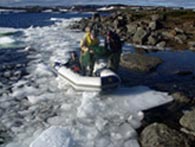
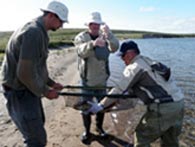
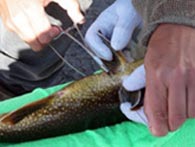
The Wildlife Division’s Aquatic Research Program conducts research projects on aquatic species. Left: Genetics sampling in Northern Labrador. Centre and right: Sampling and surgical implantation of archival data tags. Wildlife Division photos
The Wildlife Division’s Aquatic Research Program conducts research projects on aquatic species, including game fish such as brook trout (Salvenlinus fontinalis), lake trout (Salvelinus namaycush) and northern pike (Esox lucious), as well as non-game fish such as suckers (Catostomuus spp.), whitefish (Coregonis spp.) and burbot (Lota lota). Annual surveys and other research initiatives contribute to the Provincial Aquatics Database and Archive (PADA), which currently houses over 68,000 individual fish records.
Ongoing projects in aquatic research include:
- A public education and monitoring program for the lake trout management zone established in Labrador West in 2007.
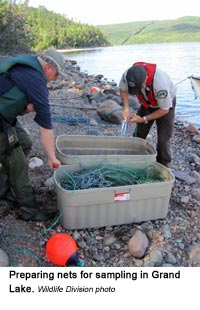
- Trans Labrador Highway sampling program – 33 lakes sampled to date (25 lakes from Phase III and 9 from Phase II).
- An outfitters’ logbook program initiated in 2002 to monitor potential impacts associated with the Trans-Labrador Highway. This long-term sentinel fishery has fostered the development of relations between government and outfitters.
- A multi-year sampling program to examine the effects of climate change on northern fish populations in Labrador.
- Two research programs on the genetics of Labrador fish, conducted in partnership with Memorial University and Dalhousie University. This work will provide a better understanding of how different species colonized both Southern and Northern Labrador, as well expand our understanding of their life history.
- Annual sampling programs in selected lakes/watersheds throughout the province. Selected lakes target areas that are undergoing fishing pressure or are of public concern, and add information to PADA.
- Annual winter creel surveys – 13 sampling routes covering 61 lakes province-wide.
- A large (deep-water) lakes sampling program, including Grand Lake.
- The national Recreational Fish Survey conducted jointly every five years since 1975 by the federal Department of Fisheries and Oceans and the Wildlife Division. This survey provides information on harvest and economics related specifically to recreational fisheries in Newfoundland and Labrador.
- A GIS-based watershed delineation program that will provide coverage of the entire province.
Inland Fish Management
The Province owns the inland fish resource and has the mandate to licence anglers and regulate its use once captured. Regulation of the Province’s mandate is found under the Wild Life Act and its subordinate legislation, including the Wild Life Regulations, CNLR 1156/96 and Guides Regulations, CNLR 60/98. Primary management authority for fisheries in the Province rests with the federal government through the Department of Fisheries and Oceans (DFO).
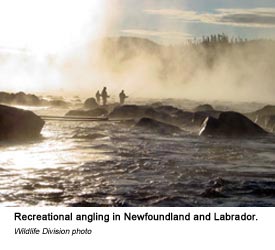 There are over 25 freshwater fish species in Newfoundland and Labrador, many of which are important to both recreational and commercial fishing. Currently, provincial regulations are used to issue licences and tags to harvest Atlantic salmon (Salmo salar) as well as non-resident trout licences. The Province is also involved in enforcement of inland fisheries through the Department of Justice Public Safety-Fish and Wildlife Enforcement Division and through cooperative efforts involving conservation officers within the Forestry and Agrifoods Agency.
There are over 25 freshwater fish species in Newfoundland and Labrador, many of which are important to both recreational and commercial fishing. Currently, provincial regulations are used to issue licences and tags to harvest Atlantic salmon (Salmo salar) as well as non-resident trout licences. The Province is also involved in enforcement of inland fisheries through the Department of Justice Public Safety-Fish and Wildlife Enforcement Division and through cooperative efforts involving conservation officers within the Forestry and Agrifoods Agency.
Currently, research conducted by the Department of Environment and Climate Change is compiled and submitted to the Canadian Science Advisory Secretariat (CSAS) of DFO. CSAS then coordinates the peer review and subsequent publication of such documents. Through this process and subsequent annual meetings, the Department is able to provide recommendations regarding management of inland fish species for specific lakes and watersheds in the Province.
The province has conducted watershed-specific research and has been influential in the adoption of management recommendations including: 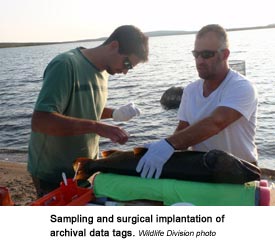
- Indian Bay Watershed;
- Middle Brook Watershed;
- Eagle Plateau Management Zone ;
- Churchill River Drainage Basin Watershed (Labrador West).
For specific details on Special Trout Management Areas and further information on Season Dates for recreational angling, please contact Fisheries and Oceans Canada at (709) 772-4423 or view the online Angler’s Guide.
